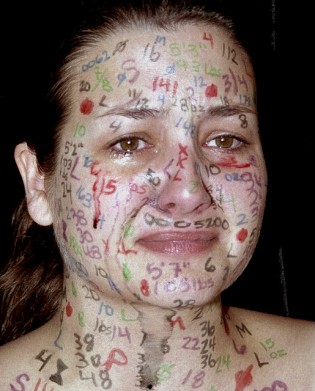What’s in a Name: Does Diagnosis Matter?
I wonder if you recognise these words, “Tis but thy name that is my enemy?” Probably not. How about this line, “…That which we call a rose by any other name would smell as sweet?”
Of course, now we’re getting warmer! That is Shakespeare’s Juliet speaking about her beloved Romeo. She has been brought up to believe that anyone with the name Montague is bad but she is questioning this and making up her own mind about the man. She concludes that whatever his name, he would still be the same person she loves.

photo credit: Liam Wilde
You will be forgiven if you did not know that In May 2013 the diagnostic manual DSM-5 was published but it did generate a bit of a flurry on the Guardian web site. It’s a tool used by psychiatrists to categorise and diagnose mental illness; if you like, a book of names.
Just before that event and deliberately timed to coincide with it, the The British Psychological Society’s Division of Clinical Psychology (DCP) published this statement:
…There is need to move away from psychiatric diagnoses such as schizophrenia, Attention Deficit Hyperactivity Disorder, personality disorder and conduct disorder, which have significant conceptual and empirical limitations, and develop alternative approaches which recognise the centrality of the complex range of life experiences in the emergence of mental distress, and the personal impact of social and relational circumstances including trauma.
What’s in a Name: Why Diagnose?
And so, an Old Chestnut is dusted off and given some further thought. One central question in the debate is does diagnosis matter? My reference to Romeo and Juliet earlier shows that Juliet realised that the object of her affection would be the same whatever his name although the play’s title might not sound as profound if the eponymous stars were Doris and Fred! This discussion is even more complex when it comes to psychological or mental distress but the names given to mental health problems can be so difficult to carry, so loaded and painful in themselves just speaking them can do harm.
I don’t think that psychologists and psychiatrists would dispute the fact that people experience mental distress but they might disagree about why these things happen. Because of this, they have different ideas about how those difficulties are dealt with. To psychiatry, diagnosis is important because it helps define and formulate treatments. It also helps them explain these things and consider what might have contributed to the likely physical malfunction that leads to the symptoms. It matters what you call things and the names they are given are important so that those ideas are consistent across the discipline. Although it doesn’t always work out this way, it has to be important for two psychiatrists to understand the same meanings attached to the same diagnoses. I don’t think that modern psychiatry ignores other factors and the biopsychosocial model definitely takes a multi-faceted approach to understanding and explaining mental health difficulties but it does concern itself largely with biological factors or brain function. One psychiatrist in This article on the Guardian site that is discussing these ideas, interestingly refers to the “electro-chemistry “of people with a mental illness.

photo credit: Christi Nielsen
The DCP statement above is clearly advocating a different approach and asking us to consider a range of social and developmental factors that might contribute to emotional or psychological disturbance. There is no doubt that all people are different even though our life experiences can be very similar. What some people find challenging or even traumatic may have devastating consequences for some whilst others will take similar events in their stride. Psychotherapy will be more likely to explore individual experiences, thinking and behaviours with each person presenting to the therapist. The aim will be to explore explanations that help to understand why things happen and once some insight develops work alongside the person to find solutions and formulate strategies that will reduce or eliminate those difficulties in the future.
Brighton Therapy Service
Brighton Therapy Service will always work with each individual to help that person understand what might be happening to them. Where appropriate, the therapists will encourage consultation with other professionals such as doctors, psychiatrists or even, social workers. Psychotherapy is not so much about naming a condition and treating it as it is about helping discover what might be an underlying cause for a behaviour or collection of behaviours that cause distress. As an example let’s imagine that you are afraid to get on a bus. You might call that an affective disorder, anxiety, a phobia or something else. If you don’t need to get on a bus, then why call it anything at all? However, if you want to use public transport and that’s important to you, then what you want to happen plainly, is to be able to travel that way. It might not mean that you stop being frightened but it will need for you to think of reasons why thousands of people around you can do something that you have trouble with. If you can work that out, you might benefit from thinking about how you can tackle it. This is what psychotherapists are good at and this is where their skill and expertise lies.

photo credit: vociferous.
Psychiatry and psychotherapy are different but we don’t want to argue that what we do here is any better only that it is different. Every person that looks to Brighton Therapy Service for help will be treated individually; the focus will be more on helping the person to understand themselves rather than us giving a name to the problem or collection of problems you describe. if you are interested in therapy or just want to know whether it might benefit you or your child, please get in touch.
Romeo and Juliete: Act 2, Scene 2
Tis but thy name that is my enemy;
Thou art thyself, though not a Montague.
What’s Montague? it is nor hand, nor foot,
Nor arm, nor face, nor any other part
Belonging to a man. O, be some other name!
What’s in a name? that which we call a rose
By any other name would smell as sweet;
So Romeo would, were he not Romeo call’d,
Retain that dear perfection which he owes
Without that title. Romeo, doff thy name,
And for that name which is no part of thee
Take all myself.
Guest Author
This entry was written by Martin Coleman. Martin has been a mental health social worker since 1996 and works and lives in Kent. He is also interested in web design and helped build www.brightontherapyservice.co.uk. He is currently developing a Social Care Directory site called Neighbourgood and you can contact him there.




Comments